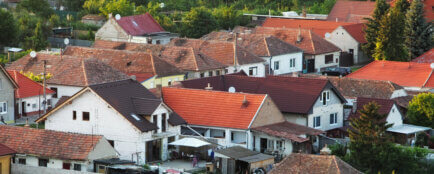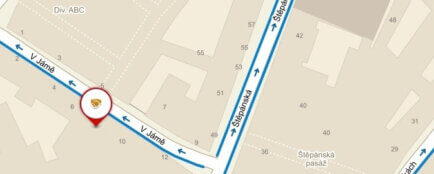Since the Czech Republic joined the European Union on May 1, 2004, the property market has been completely open to international buyers. Prague is one of Europe’s most accessible markets for intentional investors because of its competitive prices and lenient residential requirements. As of June 2025, Prague property prices average €4,800-8,000 per square meter and are growing 5-10% annually. There are no nationality-based subscriptions in the Czech republic, meaning anyone can legally purchase property in the Czech Republic without any residential requirements. State-owned assets are the only properties off limits to foreign buyers, which aren’t available for private purchase anyway.
Current Property Prices Across Major Czech Cities
Czech property prices continue to face an upward trend. The list below shows the average prices of apartments in various Czech cities.
- Prague city center (Prague 1): €8,000-12,000 per m²
- Prague residential areas (Prague 2-6): €5,500-8,000 per m²
- Prague suburbs (Prague 7-10): €4,000-6,000 per m²
- Brno city center: €5,000-5,500 per m²
- Brno residential areas: €4,500-5,000 per m²
- Plzeň: €3,400-3,800 per m²
- Ostrava: €2,000-2,400 per m²
- České Budějovice: €3,000-3,500 per m²
- Karlovy Vary: €1,700-2,000 per m²
- Liberec: €2,800-3,200 per m²
Do you have to be a EU citizen to purchase property in the Czech Republic?
No. Both EU citizens and Non-EU citizens are eligible to purchase property. “For EU citizens, most banks simply require temporary residence and a Czech rodné číslo — no additional rules usually apply and income from EU countries is accepted”
Steps to Buying Property as a Non-Resident
-
Check the real estate cadastre records
After you qualify for financing and find the property you want to purchase, you must check on your property in the real estate cadastre records. The Czech Republic’s real estate register is called the cadastre; it is where you locate information on all types of real estate, property owner information, potential restrictions, and other rights to the property.
To verify your property and the data that the seller gave you, you must know these 3 things.
- The cadastral area
- The municipality where your chosen property is located
- The ownership number (LV) that the property is registered under
Check for Joint Ownership or Property Issue
When purchasing real estate, it’s important to look at all aspects of the transaction and the property so that you don’t face surprises later on. Make sure you check the real estate acquisition title in the agreement to avoid joint ownerships marking your contract invalid in the future.
Verify the Zoning Plan and Documentation
Check the legal status of the selected real estate in the cadastre office and ask the owners for project and construction documentation. By checking with the owners about the property, you can ensure that the property wasn’t built in violation of project documentation or wasn’t approved for housing. Verify that the access road of the house is owned by a municipality and not co-owned by the homeowners because the access road is the owner’s responsibility.
In addition, you should also go to the Building Office and check the zoning plan. This allows you to ensure the stability of your long-term financial investment. The zoning plan shows the possible future developments on your property and allows you to prepare for the future.
Review the Purchase Contract with a Lawyer
Though the real estate agency might seem like they are carefully considering your real estate agreement, remember that the Real Estate agency isn’t focused on your contract, just the sale of real estate and their commissions. With a specialized real estate lawyer like Dostupny Advokat, you can successfully and efficiently navigate the process without any hidden fees or delays.
Tip for article
Tip: There are various commercial financing options available, even for those who have trouble qualifying for a mortgage. These include rent-to-own type products by companies like MOOY. Don’t be discouraged if you initially struggle to qualify.
Obtaining a Mortgage as a Non-Resident
The process of obtaining a mortgage for a non-resident is different in 2025 than before. According to the CNB, Czech National Bank, as of May 2025, “the interest rate on mortgage loans dropped to 4.61%, down by 0.29 percentage points from a year earlier.”
Not all Czech banks will provide a mortgage for non-residents, but the list below are a few that do.
- Česká spořitelna offers mortgages to foreigners with fixed and floating rates. For EU citizens, the conditions are more favorable.
- Komerční banka provides mortgages to both residents and non-residents, but requires proof of stable income and a minimum down payment of 30%.
- ČSOB (Československá obchodní banka) cooperates with foreign citizens, but requires proof of income from the Czech Republic or the EU.
- UniCredit Bank offers mortgages to foreigners, but the financing amount is limited to 70% of the property value.
- Raiffeisenbank is one of the most loyal banks to non-residents, offering mortgages with a down payment of 25%.
Mortgage Rates
Fixed Rate: 4.5% – 6.0% per annum (year)
Floating Rate: Starts from 3.8%
Minimum Down Payment: From 20-40% of the property value, often higher for non-residents.
Loan Term: 5-30 years
Maximum Loan Amount: Up to 80% of the property value
Additional Costs: loan processing fee (0.5% – 1% of the amount, property insurance, notary fees.
*Interest rates may be lower for EU residents
Borrower Requirements
Borrower Requirements for Foreigners
The list below shows the certain requirements foreigners must meet to get a mortgage in the Czech Republic.
- Verification of Income – the bank will require a certificate of income for the last 6-12 months. It must be stable income and confirmed by tax documents or bank statements.
- Age Restrictions
- Credit History – Mortgages are issued to persons ages 18 to 65 year olds, occasionally 70 years old with a high income.
- Insurance – Some banks may require proof of life insurance or property insurance
- Resident Permit – While not required, having a residence permit in the Czech Republic or EU increases your chances of a loan being approved and reduces the down payment.
Documents You Need to Have
- Passport
- Residence permit (if any)
- Though not required, this will increase your chances of a loan being approved or reduce the down payment.
- Certificate of income (from employer) or Tax Return
- Real estate purchase agreement
- Bank statement for the last 6-12 months
- Real estate valuation from an independent expert (if required by the bank)
- Credit history from the country of residence
- Tax identification number (if any)
FAQs
Do I need to be physically present to purchase property in the Czech republic?
No. The process of buying property in the Czech Republic can be done virtually with the help of a Czech attorney to help you navigate the process.
How long will the process take?
The process of buying property with a Czech lawyer takes around 1 to 3 months.
Is now a good time to obtain a property mortgage?
October to March is a low season where discounts are more likely.
What taxes should I keep in mind when purchasing?
The real estate acquisition tax is 4% of the value. In addition to that, there are also annual property taxes.
Do I need to translate my documents into Czech when giving them to the bank?
Yes. While navigating a language barrier is one of the most difficult parts of buying real estate or obtaining a mortgage in the Czech Republic, it is important to follow these guidelines correctly. When submitting important documents to the ban, you need to be translated into Czech and certified by a notary.




